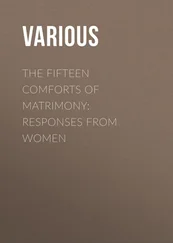Various - Excellent Women
Здесь есть возможность читать онлайн «Various - Excellent Women» — ознакомительный отрывок электронной книги совершенно бесплатно, а после прочтения отрывка купить полную версию. В некоторых случаях можно слушать аудио, скачать через торрент в формате fb2 и присутствует краткое содержание. Жанр: Биографии и Мемуары, foreign_antique, на английском языке. Описание произведения, (предисловие) а так же отзывы посетителей доступны на портале библиотеки ЛибКат.
- Название:Excellent Women
- Автор:
- Жанр:
- Год:неизвестен
- ISBN:нет данных
- Рейтинг книги:5 / 5. Голосов: 1
-
Избранное:Добавить в избранное
- Отзывы:
-
Ваша оценка:
- 100
- 1
- 2
- 3
- 4
- 5
Excellent Women: краткое содержание, описание и аннотация
Предлагаем к чтению аннотацию, описание, краткое содержание или предисловие (зависит от того, что написал сам автор книги «Excellent Women»). Если вы не нашли необходимую информацию о книге — напишите в комментариях, мы постараемся отыскать её.
Excellent Women — читать онлайн ознакомительный отрывок
Ниже представлен текст книги, разбитый по страницам. Система сохранения места последней прочитанной страницы, позволяет с удобством читать онлайн бесплатно книгу «Excellent Women», без необходимости каждый раз заново искать на чём Вы остановились. Поставьте закладку, и сможете в любой момент перейти на страницу, на которой закончили чтение.
Интервал:
Закладка:
Repeated visits to Ireland, to Scotland, and to different parts of England, Leicester, Derby, Nottingham, Plymouth, and the Channel Islands, were made at different times in her latter years; forming Prison Associations and fulfilling various engagements. In 1825 she wrote: "My occupations are just now multitudinous. I am sensible of being at times pressed beyond my strength of body and mind. But the day is short, and I know not how to reject the work that comes to hand to do." To enumerate all the good works which she originated or supported, would require more space than a brief memoir could allow. Societies for visiting prisons, libraries for the Coastguard men, reformatory schools for juvenile offenders, were among the many institutions which she established. An excellent institution at Hackney, bearing the name of the Elizabeth Fry Refuge, for the reception of discharged female prisoners, will long perpetuate the memory of her useful work.
In the summer of 1829, the family removed to a small but convenient house in Upton Lane, adjoining the Ham House grounds, the residence of her brother Samuel Gurney. In this place she passed most of her later years, and from it she went out on her many expeditions in England or on the Continent.
XII.
VISITS TO THE CONTINENT
It was not till 1838, the year after the accession of Queen Victoria, that Mrs. Fry paid her first visit to France. She saw most of the prisons of Paris, and she had most pleasant interviews with King Louis Philippe, the Queen, and the Duchess of Orleans. The Queen was much pleased with the "Text Book," prepared some years before, and said she would keep it in her pocket and use it daily. Rouen, Caen, Havre, as well as Paris, were visited. A second journey in France, in 1839, began at Boulogne, and thence by Abbeville to Paris. Here she again took interest in the prisons, obtaining from the Prefect of Police leave for Protestant ladies to visit the Protestant prisoners. Avignon, Lyons, Nismes, Marseilles were visited, and the Protestants of the south of France were much gratified by the meetings held at various places. With the brothers Courtois of Toulouse they had much agreeable intercourse. At Montauban they saw the chief "school of the prophets," where the Protestant pastors are educated, They also went to Switzerland, enjoying the scenery, and also the intercourse with the Duke de Broglie's family, then at the house of the Baroness de Staël. Above a hundred persons were invited to meet her, at the house of Colonel Trouchin, near the Lake of Geneva. Several places were visited, and they returned by Frankfort, Ostend, and Dover.
In February, 1839, she was called to pay a visit to the young Queen Victoria at Buckingham Palace. She went, accompanied by William Allen, Lord Normanby, the Home Secretary, presenting them. The Queen asked where they had been on the Continent. She also asked about the Chelsea Refuge for Lads, for which she had lately sent £50. This gave opportunity for Mrs. Fry thanking Her Majesty for her kindness, and the short interview ended by an assurance that it was their prayer that the blessing of God might rest on the Queen and her relatives.
In the autumn of that year she went to the Continent, with several companions, her brother Samuel Gurney managing the travelling. They saw Bruges, Ghent, Brussels, and the great prison of Vilvorde; Rotterdam, Amsterdam, Pyrmont, and Hameln, where there were about four hundred prisoners, all heavily chained. The prisons in Hanover at that time were in deplorable condition, about which, at an interview with the Queen, Mrs. Fry took occasion to speak.
From Hanover they went to Berlin, where a cordial welcome was received. The Princess William, sister of the late King, was in warm sympathy with Mrs. Fry's prison-work, and, after the death of Queen Louisa, was a patron and a supporter of every good word and work. After Frankfort, they went to Düsseldorf, and paid a most interesting visit to Pastor Fliedner, at his training institution for deaconess-nurses, at Kaiserswerth. Pastor Fliedner had witnessed the good results of Mrs. Fry's labours at Newgate, and he had established a society called the Rhenish Westphalian Prison Association for similar work in Germany. Everywhere authority was given to see whatever the travellers desired, so that this Continental journey was very prosperous and satisfactory. They got back to England in the autumn of 1840.
In 1841 she once more went with her brother Joseph, who was going to some of the northern countries of Europe. She knew that such a journey would be fatiguing to a frame much enfeebled by illness and a life of continuous exertion, but she still had an earnest desire to work for the good of others, if it seemed the will of her Lord and Master. "I had very decided encouragement," she says, "from Friends, particularly the most spiritual among them;" and so, all difficulties being removed, she started, with her brother and two young nieces.
The most interesting of all their North German experiences was visiting the Prussian Royal Family, then in Silesia, whither, on leaving Berlin, they had been invited to follow them. Mrs. Fry had always misgivings in regard to her intercourse with exalted personages, chiefly, she herself explained, lest in anything she said or did she might not "adorn the doctrine of God her Saviour." But she was soon put at ease as to this, on finding that she was coming to real Christians, as devoted as she was to the service of the Master, for such there have generally been among members of the House of Brandenburg. The King and Queen of Prussia were at the time residing at Ermansdorf, and most of the Royal Family were with them or in the neighbourhood. Addresses and conversations on matters connected with prisons or with religious liberty were prominent as usual, but the especial feature in the Silesian visit was the intercourse with the poor Tyrolese refugees from Zillerthal, expelled from their own country by the Austrian Government, and settled in Silesia by the permission of the late King of Prussia. These people had become converts from Romanism to the Reformed faith, by reading the Bible and religious books. After much suffering, they were commanded to quit their homes at short notice. The King of Prussia, on hearing of this cruel edict, was willing to receive them all, and gave them a new home in the domain of Ermansdorf, which they called Zillerthal, after their native village. The Countess Reden, an excellent Christian lady, was authorised to do everything for their comfort. She had cottages built in the true Tyrolese style, with balconies and all the picturesqueness of Swiss chalets. Schools were established, and every means taken to benefit the exiled families. The good Countess Reden arranged for Mrs. Fry meeting the Zillerthallers, who came in their national costume, and heard words of kind and earnest counsel from the English lady. A Moravian brother was brought a distance of forty miles to be interpreter.
XIII.
IN LONDON AND IN PARIS
Not long afterwards Mrs. Fry's greatly enfeebled health compelled her return to England. She landed at Dover on the 2nd of October. After a short stay at Ramsgate with her husband and some of her family, she was taken to Norfolk. There she received letters from the Countess Reden, giving most gratifying tidings of the impressions made by her visit, and of the practical reforms in prisons, effected by royal order since her visit to Prussia. The chaplain of the great prison at Jauer stated that above two hundred Bibles and Prayer-books had been purchased by the prisoners out of their small earnings.
In the winter of 1841, a succession of family events from time to time occupied her attention, her strength gradually improving, till at the beginning of 1842 she again took part in public proceedings. Sir John Pirie was Lord Mayor that year, and Lady Pirie had been a most valued helper of Mrs. Fry in the cause of prison reform. They were anxious to give her an opportunity, at the Mansion House, of bringing her influence to bear on persons of position, and Sir John invited Prince Albert to dine there, with the most prominent members of the Government.
Читать дальшеИнтервал:
Закладка:
Похожие книги на «Excellent Women»
Представляем Вашему вниманию похожие книги на «Excellent Women» списком для выбора. Мы отобрали схожую по названию и смыслу литературу в надежде предоставить читателям больше вариантов отыскать новые, интересные, ещё непрочитанные произведения.
Обсуждение, отзывы о книге «Excellent Women» и просто собственные мнения читателей. Оставьте ваши комментарии, напишите, что Вы думаете о произведении, его смысле или главных героях. Укажите что конкретно понравилось, а что нет, и почему Вы так считаете.












